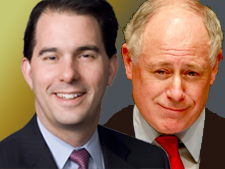It’s baaaaaack.
The issue that won’t go away: Term limits.
I predict that Bruce Rauner, a businessman who has never before held public office, will win the GOP nomination as a result of today’s Illinois Republican Party Primary for Governor, besting three career politicians sporting 60-plus years in office, total.
I’m no soothsayer; Rauner leads in the polls. The key issue driving support for him is his support for term limits.
“Term limits should apply to all politicians,” he proclaims in a TV spot, “and not just when they go to jail.”
It’s not just a cute line. Four of Illinois’ last seven governors have ended up in prison … so have a number of congressmen representing [sic] the Land of Lincoln.
Rauner’s term limits advocacy includes actual deeds. He is helping, financially and organizationally, to gather half-a-million voter signatures on a petition to place a constitutional amendment imposing eight-year term limits on state legislators before the electorate this November.
Polls show a whopping 79 percent of Illinois voters favor those term limits.
Still, powerful folks amongst the state’s other 21 percent are not pleased by Rauner, who has also called for reforming Illinois’ pension systems, ranked worst funded in the nation. Public employee unions funded a month-long TV ad blitz making baseless charges against the businessman.
With incumbent Governor Pat Quinn facing no significant opposition in the Democratic Primary, the unions are also organizing Democrats to crossover to vote for State Sen. Kirk Dillard in the Republican Primary.
But I think Dillard, the 20-year incumbent Republican officeholder, will be no match for the guy who supports term limits.
This is Common Sense. I’m Paul Jacob.




